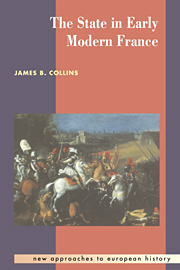Book contents
- Frontmatter
- Contents
- List of illustrations
- Preface
- Chronology of events
- Genealogy
- Glossary
- Historical background: the growth of the French state to 1627
- 1 The crucible, 1620s–1630s
- 2 The twenty years' crisis, 1635–1654
- 3 Louis XIV and the creation of the modern state
- 4 The debacle
- 5 A new France, 1720s–1750s
- 6 Reform, renewal, collapse
- 7 The crisis of 1787–1789
- Bibliography
- Index
- More Titles from the New Approaches to European History Series
7 - The crisis of 1787–1789
Published online by Cambridge University Press: 05 June 2012
- Frontmatter
- Contents
- List of illustrations
- Preface
- Chronology of events
- Genealogy
- Glossary
- Historical background: the growth of the French state to 1627
- 1 The crucible, 1620s–1630s
- 2 The twenty years' crisis, 1635–1654
- 3 Louis XIV and the creation of the modern state
- 4 The debacle
- 5 A new France, 1720s–1750s
- 6 Reform, renewal, collapse
- 7 The crisis of 1787–1789
- Bibliography
- Index
- More Titles from the New Approaches to European History Series
Summary
The parlements, the nobility, and the clergy have dared to resist the king; in less than two years there will not be any parlements, nobility, or clergy.
Keeper of the Seals Lamoignon, July 1788I was enjoying myself and watching my days go by when the French Revolution came suddenly and revived all our spirits [sic] And the word liberty so often repeated had an almost supernatural effect and invigorated us all …
Jacques Ménétra, Parisian glazierThe fiscal crisis quickly turned political, with the calling of Assemblies of Notables in 1787 and 1788 and of an Estates General in 1789. The monarchy had not used an Assembly since 1627 or an Estates General since 1614, which gives some indication of the government's desperation. The specifics of the conflicts of 1787 through 1789 can be followed elsewhere; let us begin with a very brief summary of events and then focus on the broader lines of the dispute.
The king, at Calonne's suggestion, called an Assembly of Notables, hoping to compromise with the aristocratic opposition by forging an agreement on the common grounds of the Patriot and ministerial positions. The government primarily sought to rally public opinion in favor of new taxes – a stamp tax and a land tax – by means of having the Assembly actually vote such taxes. Given that Assemblies of Notables had never had the right to do so, the assumption that this Assembly could do so proved a fatal mistake.
- Type
- Chapter
- Information
- The State in Early Modern France , pp. 257 - 267Publisher: Cambridge University PressPrint publication year: 1995

